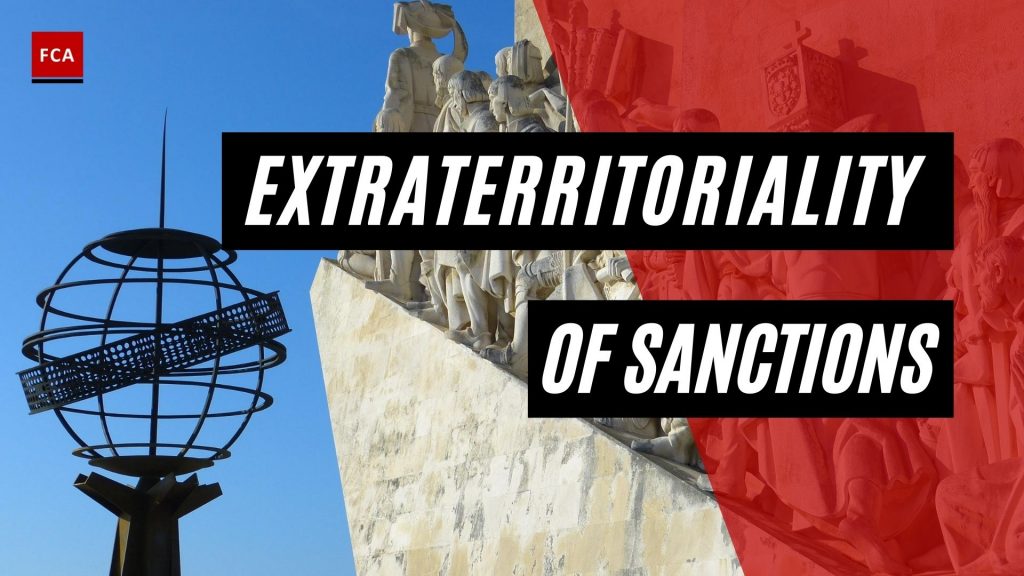We will touch base on a subject that you will come across every now and then in sanctions compliance: The extraterritoriality of sanctions.
The Extraterritoriality Of Sanctions
So essentially, an extraterritorial jurisdiction, or “extraterritoriality,” is the ability of a state to make, apply, and enforce laws, regulations, and other rules of conduct with respect to persons, property, or activity beyond its territory. The US is the primary government engaged in applying extraterritoriality to its sanctions regime.
The EU, believing that the practice of extraterritoriality violates international law, does not allow for the concept of extraterritoriality in relation to the sanctions restrictions it imposes. The EU describes extraterritorial sanctions as sanctions that “non-US citizens and companies are also expected to comply with” outside the jurisdiction of the US. These sanctions are also known as “secondary sanctions” as opposed to “primary sanctions.”

Evaluation Of Sanctions 2012 Guidelines
As stated previously, in its 2012 Guidelines on Implementation and Evaluation of Sanctions, the EU expressly states that the sanctions it imposes will apply only where links to the EU are present, so they are primary sanctions. The EU also follows this concept when it is implementing sanctions introduced by the UN. The purpose for secondary sanctions stems from globalization weakening the impact of primary sanctions as alternative finance and trade become more available.
However, people often misunderstand the idea of extraterritoriality, taking it to mean that the restrictions imposed by EU sanctions cannot apply to persons or activities once they are outside of the EU’s geographic borders. In fact, restrictions imposed by the EU apply to all EU persons, wherever they are in the world.
US Embargoes
In relation to US embargoes, the US application of extraterritoriality forbids non-US persons to export goods that are of US origin or contain content or part of US origin to embargoed countries. This prohibition of re-exports has a broad reach. While licenses can be obtained to allow for these transactions, as a general policy, these licenses are denied.
Extraterritorial U.S. Sanctions
The broad scope of US law affects people, property, and acts all over the world. In attempting to protect EU-based individuals and entities with commercial interests from its negative consequences, European policymakers have recently been exposed as more or less helpless. To pursue their strategic objectives more effectively, Europeans must focus on more than just increasing strategic autonomy from the US government. In the absence of a diplomatic agreement with the executive branch, they must also make better use of existing channels of influence.
One potential avenue would be to provide substantial diplomatic and financial support to EU-based companies in domestic courts in order to challenge the executive branch when enforcing US law beyond borders. Only the judicial branch has the ability to effectively limit the extraterritorial application of US jurisdiction.
Extraterritorial Sanctions On Trade And Investments And European Responses
Recent US sanctions against Iran, Cuba, and Russia (North Stream 2) have indirectly posed a critical challenge to the European Union. They have an important extraterritorial dimension because they purport to deter economic actors under EU jurisdiction from engaging with target countries. This affects EU business and individuals, and ultimately the sovereignty of the EU and its Member States.
A review of existing sanction regimes and the geopolitical context reveals that other international players, particularly the PR China, may follow suit in employing such measures. According to the study, extraterritorial sanctions have significant economic consequences, particularly for the EU and its vulnerabilities. Extraterritoriality raises serious concerns about its legality under general international law, WTO law, and other specific international rules. The EU is particularly affected by these measures and has already taken some countermeasures. As outlined in the policy recommendations, these could be improved and additional measures implemented.
Final Thoughts
Sanctions are now a key component of government foreign policy. This column examines the extraterritorial impact of sanctions on trade and welfare, concluding that the majority of the extraterritorial burden of sanctions falls on target countries, resulting in significant reductions in trade with third countries. Surprisingly, sanctions increase trade between senders and third countries. As a result, extraterritoriality sanctions appear to be a stick and a carrot for third countries, with the net effects depending on the size of the target and sender states, as well as the economic ties between the third countries/regions.









